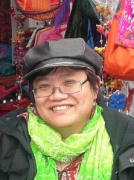

Bringing disabled women together, mobilising
and sharing through lived experiences
Eleanor Lisney : Intersectionality and disability
 ‘Nothing about us without us’ – how often do we declare and hear that as disabled people? I ve certainly carried placards and shouted the slogan on protests but tonight I want to turn it on its head. Disability intersects class, gender, ethnicity, race, religion, age, and sexual orientation – but are they always represented in the disability movement? I was told by a fellow activist that she was asked why Sisters of Frida is needed because she feels discriminated as a disabled person but not for her gender. And my response was that she obviously came from a position of privilege – yes she is white, middle class and in a salaried job and unionised. And I assume she never had the experience of feeling trapped in an abusive relationship unable to leave because she was financially dependent and that refuges meant for women escaping from domestic violence were seldom accessible or supported for disabled women. Women’s Aid outlines particular ways in which disabled women are vulnerable to physical, sexual, psychological and financial abuse – and makes the point that “Getting away from abuse is often harder for disabled women because access to help and support is often controlled by the abuser.”
‘Nothing about us without us’ – how often do we declare and hear that as disabled people? I ve certainly carried placards and shouted the slogan on protests but tonight I want to turn it on its head. Disability intersects class, gender, ethnicity, race, religion, age, and sexual orientation – but are they always represented in the disability movement? I was told by a fellow activist that she was asked why Sisters of Frida is needed because she feels discriminated as a disabled person but not for her gender. And my response was that she obviously came from a position of privilege – yes she is white, middle class and in a salaried job and unionised. And I assume she never had the experience of feeling trapped in an abusive relationship unable to leave because she was financially dependent and that refuges meant for women escaping from domestic violence were seldom accessible or supported for disabled women. Women’s Aid outlines particular ways in which disabled women are vulnerable to physical, sexual, psychological and financial abuse – and makes the point that “Getting away from abuse is often harder for disabled women because access to help and support is often controlled by the abuser.”
Racism is embedded in the system and people who have never encountered it can never understand how insidious it can be. And they, yes, even friends, make assumptions and can say things like tokenism when you insist on representation and be condescending about your culture to an extent where it is too hurtful for that friendship to be sustainable. But most of all, the real invisibles and voiceless are those women who have no recourse to legal services – for example, those whose identity documents are held by the abusers so that their residence rights cannot be proven. And how often do we hear about the ones incarcerated in residential homes/ institutionalised which put them at more risk to be exploited and abused, hidden from view.
Disabled women who are discriminated against – from feminist communities, LGBT, faith communities because they insist on congregating in non accessible venues. And the segregation is also from the disabled people’s communities because they do not understand nor interested in other identities. Where do disabled women go to discuss about the roles of being disabled lovers, mothers if they were given the opportunity of being girlfriend, wife or mother. And there are those whose sexuality were being denied or even sterilised (often presumed to be for their own good). And who knows how to support them when they are raped? A report by Professor Betsy Stanko, stated that the ‘rape of vulnerable women, especially those with learning difficulties, has effectively been “decriminalised”.
I guess I am speaking about the need for intersectionality also when we talk about disability – that we have more than one identity and we ought to acknowledge that – and that we should acknowledge we need a space for disabled women as disabled women, we need to listen to the different identities. And feminism needs to accommodate intersectionality too – speaking as a disabled woman of colour when I can be the only non white disabled at the table I feel a double disconnect. I m sure some of you here know what I m saying where you stop wanting to engage as a form of self protection.
Harriet Tubman, a disabled American bondwoman who escaped from slavery in the South to become a leading abolitionist before the American Civil War, said ‘If I could have convinced more slaves that they were slaves, I could have freed thousands more’. I think we ought to insist on being intersectional and free people from being locked into labels so that we can build a more inclusive society.

[…] mainstream disability do not often recognise women’s issues neither. I spoke on intersectionality and disability at the Sisters of Frida’s gathering/party at WoW Festival at the South […]
[…] next for disability advocacy and the future of the ADA. One panelist discussed the importance of intersectionality and the plight of incarcerated people of color with disabilities, while another panelist thought […]